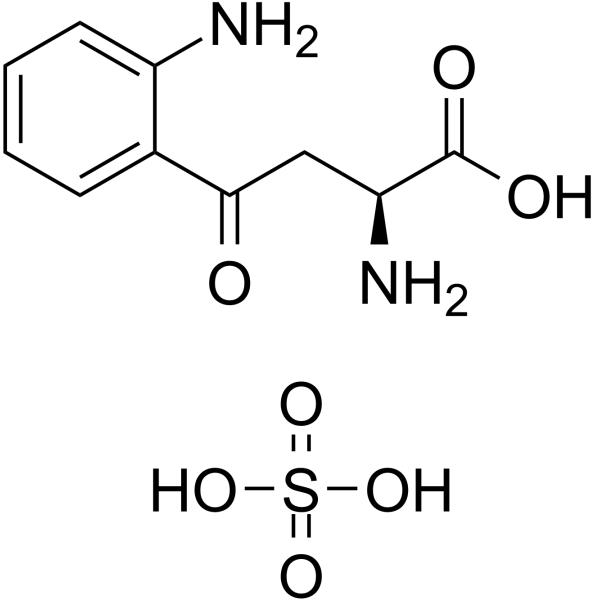L -Kynurenine sulfate salt

L -Kynurenine sulfate salt structure
|
Common Name | L -Kynurenine sulfate salt | ||
|---|---|---|---|---|
| CAS Number | 16055-80-4 | Molecular Weight | 306.29200 | |
| Density | N/A | Boiling Point | 466.6ºC at 760 mmHg | |
| Molecular Formula | C10H14N2O7S | Melting Point | 196 °C | |
| MSDS | Chinese USA | Flash Point | 236ºC | |
|
Effects of pro-inflammatory cytokines on expression of kynurenine pathway enzymes in human dermal fibroblasts.
J. Inflamm. (Lond.) 8 , 25, (2011) The kynurenine pathway (KP) is the main route of tryptophan degradation in the human body and generates several neuroactive and immunomodulatory metabolites. Altered levels of KP-metabolites have been observed in neuropsychiatric and neurodegenerative disorde... |
|
|
The L-kynurenine signalling pathway in trigeminal pain processing: a potential therapeutic target in migraine?
Cephalalgia 31 , 1029-1038, (2011) In recent years the kynurenine family of compounds, metabolites of tryptophan, has become an area of intensive research because of its neuroactive properties. Two metabolites of this family have become of interest in relation to migraine and pain processing.E... |
|
|
Inhibition of indoleamine 2,3-dioxygenase activity by levo-1-methyl tryptophan blocks gamma interferon-induced Chlamydia trachomatis persistence in human epithelial cells.
Infect. Immun. 79 , 4425-4437, (2011) Gamma interferon (IFN-γ) induces expression of the tryptophan-catabolizing enzyme indoleamine 2,3-dioxygenase (IDO1) in human epithelial cells, the permissive cells for the obligate intracellular bacterium Chlamydia trachomatis. IDO1 depletes tryptophan by ca... |
|
|
Targeting the kynurenine pathway-related alterations in Alzheimer's disease: a future therapeutic strategy.
J. Alzheimers Dis. 24 , 199-209, (2011) Alzheimer's disease (AD) is a chronic neurodegenerative disorder associated with dementia as a main feature. Despite decades of thorough research in the field of AD, the pathomechanism is still not fully understood. The development of novel experimental model... |
|
|
KynR, a Lrp/AsnC-type transcriptional regulator, directly controls the kynurenine pathway in Pseudomonas aeruginosa.
J. Bacteriol. 193(23) , 6567-75, (2011) The opportunistic pathogen Pseudomonas aeruginosa can utilize a variety of carbon sources and produces many secondary metabolites to help survive harsh environments. P. aeruginosa is part of a small group of bacteria that use the kynurenine pathway to catabol... |
|
|
Amino acids inhibit kynurenic acid formation via suppression of kynurenine uptake or kynurenic acid synthesis in rat brain in vitro.
Springerplus 4 , 48, (2015) The tryptophan metabolite, kynurenic acid (KYNA), is a preferential antagonist of the α7 nicotinic acetylcholine receptor at endogenous brain concentrations. Recent studies have suggested that increase of brain KYNA levels is involved in psychiatric disorders... |
|
|
Role of the NMDA-receptor in Prepulse Inhibition in the Rat.
Int. J. Tryptophan Res. 3 , 1-12, (2010) Kynurenic acid (KYNA) is an endogenous metabolite of tryptophan. Studies have revealed increased brain KYNA levels in patients with schizophrenia. Prepulse inhibition (PPI) is a behavioral model for sensorimotor gating and found to be reduced in schizophrenia... |
|
|
Synthesis and biological effects of some kynurenic acid analogs
Bioorg. Med. Chem. 19 , 7590-6, (2011) This paper reports the synthesis of 10 new KYNA amides (KYNA-1–KYNA10) and on the effectiveness of this molecule as an inhibitor of excitatory synaptic transmission in the CA1 region of the hippocampus. The most effected molecule is newly synthetized KYNA-ana... |
|
|
Involvement of kynurenines in Huntington's disease and stroke-induced brain damage. Stone TW, Forrest CM, et al.
J. Neural Transm. Gen. Sect. 119(2) , 261-74, (2011)
|